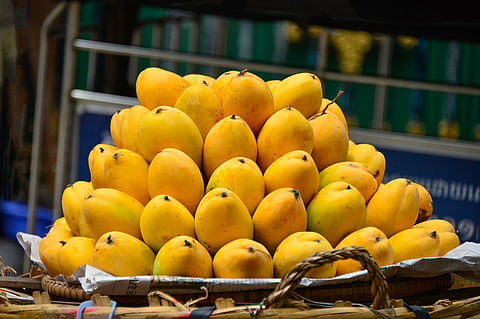
- Home
- EventsEvents
- Product Launches
- CategoriesCategories
- Advertise
- Opinion

Ripening of fruits is a natural phenomenon that makes the fruits edible, palatable, and nutritious for consumers. Similarly, artificial ripening is a process by which fruits are ripened artificially in a controlled manner to achieve a desired outcome like optimum ripening and better consumer acceptance, apart from ensuring a longer shelf life of fruits. Artificial ripening also facilitates the transportation of fruits like mango, which becomes soft and perishable after ripening as the fruits are transported to distant places in unripe conditions to avoid losses and are artificially ripened at the destination market before sale.
However, due to the presence of traces of arsenic and phosphorus which are harmful to humans and may cause dizziness, frequent thirst, irritation, weakness, difficulty in swallowing, vomiting, skin ulcer, and much more, FSSAI has prohibited the use of Calcium carbide also known as ‘Masala’ as a ripening agent for artificial ripening of the fruits as per the provision in sub-regulation 2.3.5 of Food Safety and Standards (Prohibition and Restrictions on Sales) Regulation, 2011.
Acetylene gas released from calcium carbide is equally harmful to handlers. There are chances that calcium carbide may come in direct contact with fruits during application and leave residues of arsenic and phosphorus on fruits. Thus, the use of this chemical for the ripening of fruits, is banned in India. Accordingly, to ensure that fruit ripening is strictly regulated as per the permitted practices through the use of approved sources of ethylene only, FSSAI has recognized ‘ethylene’ as a safe ripening agent at a concentration of up to 100 ppm (100μl/L) depending upon the crop, variety, and maturity through sources like ethephon, ethereal. Treatment of unripe fruits with ethylene gas triggers the ripening process, until the fruit itself starts producing ethylene in large quantities. However, it has been further directed that such material should also not come in contact directly with the fruits to be ripened artificially.
A Standard Operating Procedure (SOP) detailing all aspects of the artificial ripening of fruits by ethylene gas has already been issued by FSSAI.
However, despite the above directions, it has been brought to the notice of FSSAI that the traders/handlers are still indulging in the use of prohibited material, i.e. Calcium Carbide, or are using the approved sources of ethylene gas incorrectly, like dipping the fruits in ripening agent solutions which may render the fruits unsafe for human consumption.
Therefore, all the traders/fruit handlers/FBOs operating ripening chambers are directed to strictly comply with the above directions and refrain from using any prohibited material or incorrectly deploying approved sources of ethylene for the artificial ripening of the fruits. Any such incident, noticed, shall be dealt with stringently, and serious action will be taken against the person(s) indulging in such unlawful practices as per the provisions of the FSS Act, 2006, and Rules/Regulations made there under.
Click HERE to subscribe to our FREE Weekly Newsletter
